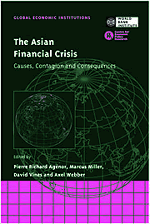Book contents
- Frontmatter
- Contents
- List of figures
- List of tables
- Preface
- List of conference participants
- Acknowledgements
- List of abbreviations and acronyms
- Introduction
- Part One General Accounts
- 1 The role of macroeconomic and financial sector linkages in East Asia's financial crisis
- Discussion
- 2 The Asian crisis: lessons from the collapse of financial systems, exchange rates and macroeconomic policy
- Discussion
- 3 Are capital inflows to developing countries a vote for or against economic policy reforms?
- Discussion
- 4 The Asian crisis: an overview of the empirical evidence and policy debate
- Discussion
- Part Two Theoretical Contributions
- Part Three Contagion
- Part Four Policy Responses
- Index
Discussion
from Part One - General Accounts
Published online by Cambridge University Press: 26 February 2010
- Frontmatter
- Contents
- List of figures
- List of tables
- Preface
- List of conference participants
- Acknowledgements
- List of abbreviations and acronyms
- Introduction
- Part One General Accounts
- 1 The role of macroeconomic and financial sector linkages in East Asia's financial crisis
- Discussion
- 2 The Asian crisis: lessons from the collapse of financial systems, exchange rates and macroeconomic policy
- Discussion
- 3 Are capital inflows to developing countries a vote for or against economic policy reforms?
- Discussion
- 4 The Asian crisis: an overview of the empirical evidence and policy debate
- Discussion
- Part Two Theoretical Contributions
- Part Three Contagion
- Part Four Policy Responses
- Index
Summary
In chapter 3 and a companion paper (Dooley, 1997), Michael Dooley outlines an argument that various distortionary domestic policies are, to a significant degree, responsible for large financial capital inflows and subsequent financial and currency crises in the 1990s. This argument is an application of the broad truth that inflows of foreign financial capital can have undesirable welfare consequences in the presence of distortionary domestic policies, which is itself an application of the general theory of the second best. Dooley observes that many government policies toward financial intermediation provide implicit contingent insurance for asset holders. The distribution of the benefits of these implicit insurance subsidies can differ between foreign and domestic holders of claims on domestic debt service or dividends. Because of its basis in market and policy-induced distortions, this approach directly links welfare consequences to speculative capital inflows and currency crises.
Explicit and implicit insurance schemes are used by governments to avoid the real costs of domestic liquidity crises. Potential financial market intervention can distort the pattern of investment when such insurance is subsidised by the government, leading to excessive borrowing, investment or risk-taking. In the presence of international capital mobility, foreign purchasers of various domestic assets can partake of the benefits of these insurance schemes, including any implicit subsidies. This leads to the policy-created international capital market arbitrage opportunities Dooley mentions. It seems sensible to think that opportunities for private market participants to raid the public coffers are more acute for countries undergoing financial market development and liberalisation than for countries with fairly established institutions for regulating financial market activity.
- Type
- Chapter
- Information
- The Asian Financial CrisisCauses, Contagion and Consequences, pp. 123 - 126Publisher: Cambridge University PressPrint publication year: 1999



